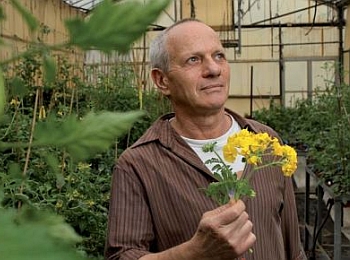| | 12 June, 2012
| | International consortium, including Hebrew University scientist, ‘decodes’ the tomato genome | |
 | | Prof. Dani Zamir |
|
The tomato genome sequence – both the domesticated type and its wild ancestor, Solanum pimpinellifolium -- has been sequenced for the first time by a large international team of scientists, including a researcher from the Hebrew University of Jerusalem.
The achievement – an important tool for further development of better tomato production -- by the 300-plus-memberTomato Genome Consortium (TGC) is reported on in the May 31 issue of the journal Nature.
The consortium includes Prof. Dani Zamir of the Robert H. Smith Faculty of Agriculture, Food and Environment of the Hebrew University. Other scientists in the project are from Argentina, Belgium, China, France, Germany, India, Italy, Japan, South Korea, Spain, the Netherlands, the United Kingdom and the United States.
When Columbus brought tomato seed from America to the old world some 500 years ago, he probably never imagined that it would be such a major contributor to human nutrition, health, culinary pleasure and international cooperation.
This latest quantum leap in knowledge of the tomato genetic code (35,000 genes) provides a means to match DNA sequences with specific traits that are important for human well being or taste, such as flavor, aroma, color and yield.
Beyond improvement of the tomato, the genome sequence also provides a framework for studying closely related plants, such as potato, pepper, petunia and even coffee. These species all have very similar sets of genes, yet they look very different.
How can a similar set of “genetic blueprints” empower diverse plants with different adaptations, characteristics and economic products? This challenging question is being explored by comparing biodiversity and traits of tomato and its relatives.
The Tomato Genome Consortium started its work in
2003, when scientists analyzed the DNA sequence of tomato using the most modern equipment available at the time. Fortunately, with the recent introduction of so-called “next generation sequencing” technologies, the speed of data output increased 500-fold and enabled the project to move on efficiently to its conclusion.
|
|


